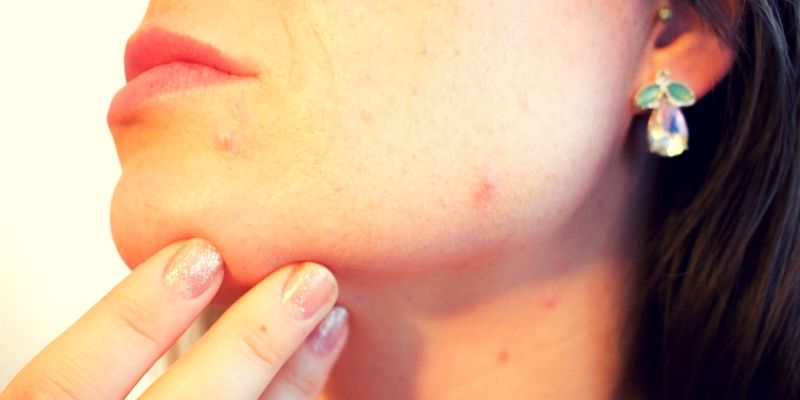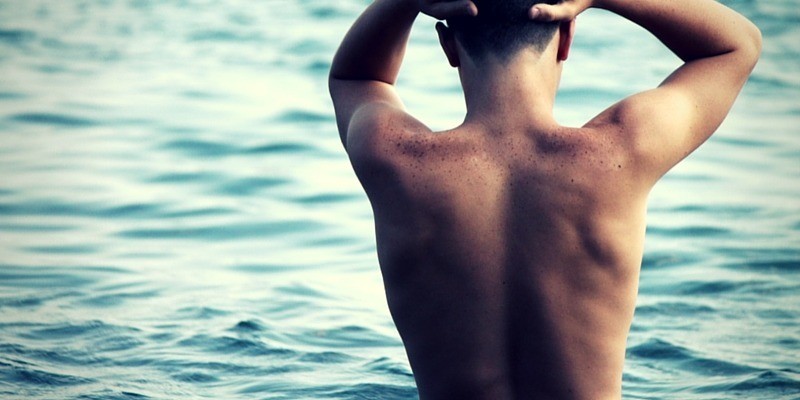Welcome to the third part of our multi-part guide on beating acne. So far, we’ve covered some background information and the different types of acne as well as what causes acne and the most common triggers to avoid.
Now we’re going to take a closer look at what you can do to prevent acne from even popping up before it rears its ugly head. Sure treatment is important but if you can avoid having something to treat — that’s even better.
First let’s start off with some general tips and then afterward we’ll take a look at the changes you can make to your skincare routine and diet.
1. Change Your Pillows And Wash Your Sheets
Guess what happens each night while you’re rolling around in bed with your face brushing up against your pillowcase? You get dead skin cells, bacteria, sweat, and sebum all attaching to your skin because your face is in contact with what seemingly looks like a clean bed for about 8 hours each night.
All of these nasty things which you don’t want on your skin accumulate over time. You go to bed one night all sweaty and dirty, and that stuff stays there waiting for you the next time. It might look clean but your pillows and sheets can absorb sweat and sebum without turning a yellowish color.
Change your sheets consistently (about once a week) and if you’re sleeping on a pillow, flip it over to the other side the next day so you aren’t laying on the same side two nights in a row.
Another thing to try if you don’t have the means to go through several pillows is to sleep on a clean towel placed over one. As long as your face is laying on something clean you should be fine.
2. While You’re At It, Get Some More Sleep
Too little sleep leads to psychological stress which if you remember from Part 2 where we discussed what causes acne, can potentially lead to breakouts as cortisol — the hormone released when you experience stress — rises after too little sleep and increases the chances of developing acne.
Lack of sleep also makes you more prone to overeating foods you know you shouldn’t be eating which can also worsen acne conditions. As we like to remind people, nutrition is the foundation of every great skincare routine and putting bad food in your body isn’t doing your skin any favors.
3. Shower More Often
We know not everyone reading this showers every day for whatever reason. Maybe you think it’s unnecessary, or you’re trying to conserve water and save the environment, or maybe you’re just plain lazy. If you’re struggling with acne you may want to reconsider your routine for your own sake.
If you’re like some of us and you get home from school or work with a greasy face or sweat on your back do you think it’s a good idea to leave it alone until you do your nightly skincare routine?
We don’t think so.
If your skin is leaking oil like the BP Horizon spill get yourself into the shower and let the water wash away all that grease.
And be careful with using hot water. You don’t have to take ice cold showers either but when the water’s steaming there’s a good chance it will irritate your skin or excessively dry it out. Mildly warm water is perfect and will avoid the pit falls of too much heat over skin.
Remember this doesn’t even technically have to be a proper “shower”. You don’t have to shampoo or even use soap and body wash. Just quickly get in, put on the water for about 5 minutes, let it splash over your face and get out.
You need to keep your skin from getting excessively greasy and becoming the kind of home acne wants to live in. Don’t make your skin welcoming to acne. It might not be great for the environment but it’ll be great for you.
4. Avoid Touching Your Face
Your hands and fingers are constantly interacting with the world around you and in case you haven’t noticed — the world is a pretty dirty place.
Your hands come into contact with bacteria, grease, and who knows what else and then when you touch your face that stuff transfers over to your skin.
This is a pretty simple tip to follow but you may not even notice that you’re touching your face. It’s easy to just forget and rest your cheek on your palm as you’re browsing the internet or begin picking at an annoying pimple so be mindful. (You aren’t really picking at your acne are you? Picking acne further inflames your skin making it even harder to get rid of!)
5. Sanitize Your Cell Phone
De-germing your phone screen with a little hand sanitizer each day can help out with the previous tip. With our fingers constantly touching our phone screens through most of the day it’s no surprise that germs and bacteria find it a comfy place to live. The problem is we then touch our face with the same fingers transferring them over to our skin.
We really can’t stress enough how important it is to keep your hands away from your face!
6. Keep Your Hair Clean
This is especially important if you have longer hair or a hairstyle that has hair covering your face like bangs coming down your forehead. Your hair gets greasy and dirty and then it rests on your face. See the problem here? Another reason to shower consistently.
Side Note: While keeping your hair clean is good, it’s also important not to overdo the shower thing. Washing your face too often irritates your skin which inadvertently can actually clog pores. Two times a day and a quick shower is more than enough for your skin.
7. Don’t Pop Existing Pimples
We know some of you will disagree with us but consider this. When you pop a pimple, the pus that’s inside oozes out over the surrounding area. Unless you immediately wipe away or wash off the pus, it’ll stick to your skin and clog up pores causing future pimples to appear in the same place.
Sometimes if the pimple hasn’t fully matured yet, it becomes inflamed and leaves behind a red mark or a dot where it used to be. This is called hyperpigmentation and it can take months for it to go away on its own.
We know it’s tempting to just get it over with and squeeze out the pus but instead try spot treating the area with some benzoyl peroxide or salicylic acid (we talk about those and other treatments in the next part of this guide) or letting it go away on it’s own. That way, it’s less likely to leave behind a mark and you won’t have to worry about the pus that leaks out causing you further headaches.
8. Get More Exercise
Working up a sweat increases blood circulation which can help deliver much needed nutrients to your skin. If you’ve ever noticed your face getting red after a workout you know the blood rushes externally bringing much needed oxygen to your skin cells while also carrying cellular waste away.
Sweating also helps remove toxins rooted deep within your skin as the sweat helps dislodge your pores taking all the bad stuff away with it which can help acne symptoms improve.
9. Drink More Water
Drinking water is another way of flushing out internal toxins and hydrating your skin from the inside out. While following this step alone won’t get you far, combining it with the others will ensure your skin remains elastic and supple instead of tight which is more easily irritated. Irritation overall is bad for skin but when you have acne it only makes symptoms worse.
10. Take Off Your Makeup Before You Go To Bed
You know you should be doing this every night but we thought we’d mention it here again just in case (Because we know for a fact not all of you reading this follow this rule diligently).
Please don’t be lazy. Your skin will thank you for it.
—
These are all really simple things you can do starting today to improve the quality of your skin. Look we’re not trying to turn you into a clean freak or become paranoid about sleeping in your own bed and keeping everything around you clean.
Just be aware that these are things that could be the source of your skin woes and are making your acne worse even though you’re doing everything else right. By changing a couple of habits you can see a big difference.
Now let’s look at some other changes that will help prevent acne including the skincare products you use and the types of food you eat.
Changes To Your Skincare Routine
If you haven’t already, go through this post which walks you through what a basic skincare routine looks like step by step — Cleanse, Exfoliate, Spot Treat, Moisturize, and Protect. It will also help you determine what your own skin type is which is useful to know when choosing specific products for your routine.
Here are some more things to keep in mind regarding your skincare routine here.
Be absolutely sure the products you’re using aren’t causing you to breakout. Are you at least using non-comedogenic products? This means they avoid ingredients that clog up pores. Clear pores are good because acne has a harder time of forming if it doesn’t get a chance to “plant its roots” deep within your skin.
Do you have sensitive skin? If so, are you avoiding these known skin irritants? Keeping your skin from getting irritated can help prevent acne symptoms from getting worse by avoiding inflammation and more severe forms of acne like cysts from developing.
In addition to the steps we outlined in the guides above, try incorporating a clay mask into your skincare routine to exfoliate and draw out any impurities before they begin causing you trouble. There are also cream-based facial masks which you can leave on overnight to help prevent breakouts while you’re rolling around in bed each night. See our guide on facial masks to help choose the right mask for you.
And finally, you may want to consider implementing a toner into your routine. While they aren’t absolutely essential, the right toner can return the pH level of your skin back to normal after cleansing or exfoliating and also help unclog pores by removing trace grime and oil left behind.
This is absolutely crucial because your skin’s lipid barrier, its natural defense against environmental toxins, needs to remain within a certain pH level to be at its strongest.
Toners have kind of went out of style once brands started creating products taking into account the skin’s natural pH level (around a 5.5 on the scale) but if you’re using stronger products like foam cleansers they can still be helpful because even a slightly out of balance pH level encourages acne to thrive on your skin. Toners nowadays do a lot more than just balancing pH levels but that’s for another day.
On-The-Go Treatments To Prevent Acne
Mattifying powders and oil absorbing blotting papers are the best way to treat shiny skin and prevent acne from forming when you’re on the go and don’t have access to the rest of your products or treatments. They’re portable and small enough to keep in a bag or purse so just head over to a restroom when you feel your skin is starting to get oily and apply them over your problem areas.
The powders will eliminate any shininess and help dry up your skin. The blotting papers will also soak up excess oil and once they’re done you can just throw them out.
Diet Changes To Prevent Acne
Taking what we know from what causes acne, and the nutrients good for our skin we know we can help prevent acne by eating the right kinds of foods.
To summarize the above links:
- Avoid sugary foods and drinks.
- Try cutting out dairy and see if it makes a difference for you.
- Eat lots of fruits, vegetables, and Omega 3 fatty acids.
- Drink plenty of water.
Foods high in antioxidants may or may not help get acne under control as research hasn’t made a clear link between the two but they certainly won’t hurt you. Having low levels of Vitamin A and E seem to be associated with increased acne severity and these antioxidants may play an important role in reducing symptoms of inflammatory types of acne like cysts and pustules.
Since the types of foods high in antioxidants are usually fruits and vegetables you’ll also be getting a number of tiny trace minerals and nutrients which may be beneficial towards acne but aren’t known yet. Sounds crazy but scientists are still discovering new micronutrients in foods that offer hidden benefits. It was only a few years ago that scientists discovered carotenoids which are pigments found in certain foods like carrots and tomatoes makes skin more attractive.
One more thing that can help: Supplementing zinc (specifically zinc gluconate as its the most bioavailable form) or getting more zinc through your diet (found in oysters, beef, lamb, and seeds) can go a long way in helping prevent acne. Zinc reduces your skin’s oil production, kills the acne causing bacteria, and most importantly — reduces inflammation so existing acne doesn’t get worse.
Vegetarians in particular will benefit from a zinc supplement as it’s mostly found in meats. Our favorite zinc supplement is NOW Foods’ 50 mg Zinc Gluconate. It contains no soy, milk, gluten, wheat, eggs, starch, or preservatives of any kind making it a good choice if you won’t eat or can’t tolerate any of those ingredients.
Anywhere between 30-50 mg a day will be fine for most people just make sure you’re eating it with some fats to let your body absorb it better. Zinc has proved its effectiveness towards acne in studies and one tablet a day could be all you need to keep acne away.
Now that you know what you can do to prevent acne, the next question to answer is how can you treat existing acne. Click that for the next part of our ultimate guide to beating acne.





